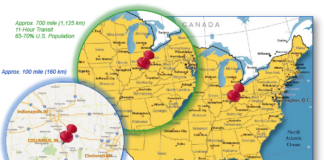In Washington state next-generation battery materials company Sila has begun building out its first, auto-scale manufacturing plant, Sila Moses Lake. The project affirms a 2025 start for the first commercial production of Sila’s breakthrough Titan Silicon™ anode at the plant. Sila is also investing in workforce development through partnerships with local technical schools to ensure a strong talent base to support its manufacturing scale-up.

The build-out at Sila’s plant will include automotive-scale production lines and state-of-the-art quality systems. At the start of production, the plant will deliver enough capacity to serve multiple automotive customers, including Mercedes-Benz.
“For an innovation to have a meaningful impact on accelerating the adoption of EVs, two things are imperative,” said Gene Berdichevsky, Co-founder and CEO of Sila. “First, the new technology must deliver superior performance, raising the bar and making EVs more appealing to a broader group of people — which we accomplished with the launch of our Titan Silicon anode. Second, the technology has to scale massively so as not to become a niche; and we’re pleased to take the next step in our unwavering journey to reach global scale with the start of construction at Moses Lake.”

Sila’s Titan Silicon anode delivers a 20% energy density increase over the industry’s best performing graphite cells – enabling automakers to deliver unmatched EV performance, dramatically increasing vehicle range and reducing charge times. Beyond its transformative impact on lithium-ion batteries and the automotive industry, the build-out of Sila’s plant will also help to drive U.S. leadership in domestic manufacturing and energy security.
“I’m happy to welcome Sila to Washington and Moses Lake, home to a growing number of clean energy innovators solving some of our biggest challenges in this transition,” said Governor Jay Inslee. “Producing the best EVs possible is a key piece of that transition and I look forward to seeing Sila’s pioneering work come to fruition.”
“The Office of Manufacturing and Energy Supply Chains (MESC) is pleased to announce this $100 million investment to scale up silicon anode manufacturing with Sila, a company that has been part of the Department of Energy’s portfolio from its infancy, when it received an ARPA-E grant”
— Giulia Siccardo, MESC Director
Last year the U.S. Department of Energy (DOE)’s Office of Manufacturing and Energy Supply Chains (MESC) selected Sila to receive $100 million in funds to accelerate the build-out of its Moses Lake plant. Sila has successfully executed the contract with MESC, whose investment in Sila will support hundreds of jobs and strengthen the U.S battery supply chain.
“The Office of Manufacturing and Energy Supply Chains (MESC) is pleased to announce this $100 million investment to scale up silicon anode manufacturing with Sila, a company that has been part of the Department of Energy’s portfolio from its infancy, when it received an ARPA-E grant,” said Giulia Siccardo, MESC Director. “With this plant, Sila and Moses Lake are poised to manufacture a revolutionary battery material that improves performance, lowers cost, and accelerates our electric future.”
EDA Announces 31 Tech Hubs Across U.S.
New Tech Hubs program will drive regional innovation and job creation by strengthening a region’s capacity to manufacture, commercialize, and deploy technology. Read more…
Sila will use a portion of the funding received from the DOE to invest in local workforce development through partnerships with Big Bend Community College (BBCC) and Columbia Basin Technical Skills Center (CB Tech) on coursework development and dedicated training programs to prepare students for entry-level technical and operations positions. In the next five years, Sila expects to hire between 100-500 full-time employees and ramp plant capacity to power one million cars.













![[VIDEO] Get More for Your Business in Ardmore. Oklahoma](https://businessfacilities.com/wp-content/uploads/2024/02/maxresdefault-324x160.jpg)
